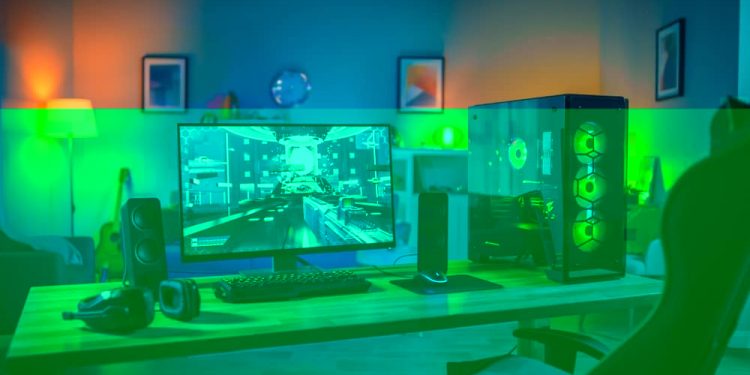Most gaming enthusiasts and professionals prefer building a custom PC using all the high-end parts when it comes to gaming. However, gaming laptops have garnered quite some traction over the years. They might not be as good as a desktop PC, but you can expect good performance from them.
So, what to look for when buying a gaming laptop? There’s not just one thing or two but several things you’d need to pay attention to when making informed decisions. One thing you need to keep in mind is that gaming laptops aren’t usually upgradable. There might be some options to upgrade your laptop from a laptop repair shop like SSD, RAM, etc., but mostly you will use the internal parts that’ll come originally with the laptop. So, let’s see what aspects are significant in choosing a gaming laptop.
1- Display:
With display comes three things to mind: size, screen resolution, and refresh rate. Some gamers prioritize the image quality and do not mind sacrificing the refresh rate a little, while others compromise on the resolution to get fast refresh rates.
-
Size:
Gaming laptops usually come with a 15-inch or 17-inch screen size. However, you may find some 13-inch, 14-inch, or 18-inch laptops in the market. If you like large screens, a 17-inch laptop will work fine. But, considering travel, you might want to go with a smaller and lighter notebook.
-
Resolution:
For an average gamer, a resolution of 1920 x 1080p would work excellently. But, if you’re into getting higher screen quality, 2560 x 1440p or 3840 x 2160 (4k) resolutions are available on the market. However, the higher resolution you go for, the more high-end CPU and GPU you’d require to run games at these settings.
-
Refresh Rate:
You can get a refresh rate of 60Hz with a 1080p display which is a good deal. Some laptops offer higher refresh rates, from 120Hz to 360Hz, for a smooth playing experience. However, without a high-end GPU, you might not be able to take advantage of these rates.
-
OLED:
Some gaming laptops come with OLED displays that produce their own light, creating beautiful and vibrant colour schemes and contrasts. But, these screens may offer lower refresh rates.
2- GPU
A graphics card plays the most significant role in running high-quality games smoothly. You can’t expect to play a decent game without a suitable GPU. The majority of the gaming laptops include GPUs by Nvidia GeForce (GTX and RTX series). Meanwhile, AMD also provides excellent GPUs to consumers with its Radeon RX series.
-
For Beginners:
For beginners happy with average gaming, settings can play well with a GTX 3050 or GTX 3060 card. AMD RX 5500M is another great option for entry-level players. Laptops with these GPU options might cost around $900 to $1,100.
-
For Mainstream Players:
For mainstream players, RTX 3060 would be a middle-ground that’ll allow you to play most of the games on high settings. And if you want to upgrade performance levels more at high settings, then RTX 3070 Ti will give you that fuel you require. From AMD, you could go for RX 6700M or 6800M. These specs could cost anywhere from $1,200 to $1,500.
-
For Pros:
Professionals who play at the highest settings could prefer RTX 3070. However, the latest cards of the series RTX 3080 and 3080 Ti would boost your gaming experience to the point where you don’t have to worry about the settings and play the most graphically intense games enjoying smooth VR effects.
3- CPU:
A CPU isn’t an upgradable component, so you must get a decent CPU to begin with. We suggest getting Intel Core i7 for mainstream players as it’ll go well with a high-end GPU and provide good performance overall. The latest Intel Core i9-12900HK provides the benefit of overclocking for enhanced performance. So, pros could look to invest in this chip. For beginner-level players, Intel Core i5 would do the job.
4- RAM and Storage:
RAM and Storage are aspects of a gaming laptop that can be upgraded with time. If you can’t afford to invest in the RAM, you could begin with 8GB with the GTX 3050 GPU. However, the recommended RAM is 16GB to support smooth performance. You can also upgrade it to 32GB.
For Storage, the majority of the laptops provide both HDD and SSDs. While some affordable laptops provide only 1TB of HDD storage, you can get a 128GB SSD along with a 1TB HDD which is ample Storage for gaming.
5- Keyboard
Keyboards are pretty important for gamers. You could invest in Razer keyboards that specialize in producing top-notch gaming keyboards with backlight and mechanical switches. You could connect the external keyboard with the laptop through a USB port instead of using the one that comes with it.
Final Thoughts:
Many brands like Dell Alienware, HP, Asus, etc., produce gaming laptops. However, these laptops sometimes are or aren’t upgradable. So, it would be best to choose all features carefully from the beginning. If you want, you can go to a laptop repair shop for upgrades. Master Computer is a reputable PC/laptop repair shop that provides custom-built gaming PCs. So, you could get possible upgrades with ease.
Follow Techdee for more!





